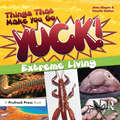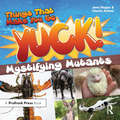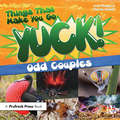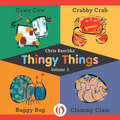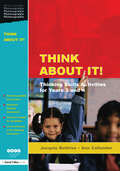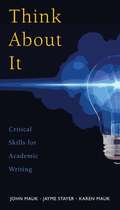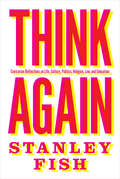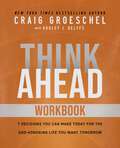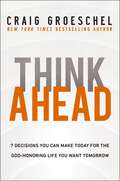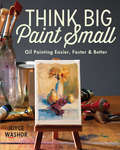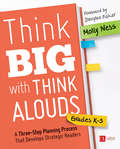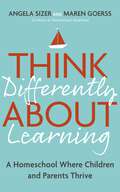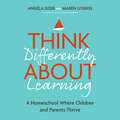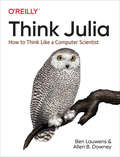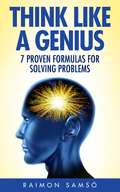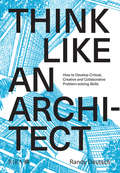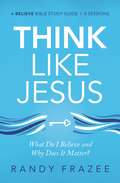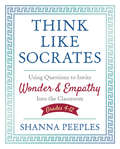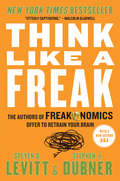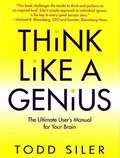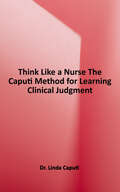- Table View
- List View
Things That Make You Go Yuck!: Extreme Living
by Jennifer Dlugos Charlie HattonLife isn't always easy, but some organisms take hard living to the extreme. Things That Make You Go Yuck!: Extreme Living looks at organisms living in the weirdest of ways: swimming miles deep in the ocean, freezing on icy mountaintops, boiling in hot springs, or even floating in space. You'll also find critters bigger, smaller, softer, longer, and stretchier than you ever thought possible. Whether it's nature's slimiest organisms or the weirdest mutations, Things That Make You Go Yuck! celebrates survival of the fittest, grossest, craziest, and creepiest things in nature, proving once and for all that life in the wild is anything but ordinary.Ages 9-12
Things That Make You Go Yuck!: Mystifying Mutants
by Jennifer Dlugos Charlie HattonHexapus. Singing mice. Spider worm. They sound like creatures from horror movies, but they are all real-life mutants that creep, crawl, and slither among us. In Things That Make You Go Yuck!: Mystifying Mutants, you'll learn that genes can be a freaky and fascinating business. From two-toned lobsters to hairless cats, this book showcases the strangest and most shocking genetic mutants in the plant and animal kingdoms. Whether it's nature's slimiest organisms or the weirdest mutations, Things That Make You Go Yuck! celebrates survival of the fittest, grossest, craziest, and creepiest things in nature, proving once and for all that life in the wild is anything but ordinary.Ages 9-12
Things That Make You Go Yuck!: Odd Couples
by Jennifer Dlugos Charlie HattonIt takes two to tango—but in the wild, two can do much crazier things than dance. In Things That Make You Go Yuck!: Odd Couples, you'll find out about nature's strangest dating rituals, cooperative couples, and parasitic pests. You'll explore symbiotic pairings like crabs that carry sea urchins on their backs, and hybrid “franken-species” that seem like something out of a science-fiction tale. Whether it's nature's slimiest organisms or the weirdest mutations, Things That Make You Go Yuck! celebrates survival of the fittest, grossest, craziest, and creepiest things in nature, proving once and for all that life in the wild is anything but ordinary.Ages 9-12
Things With Wings (Time For Kids® Informational Text #Guided Reading Level F)
by Dona RiceEarly readers learn about wings, wing anatomy, and animal flight in this descriptive nonfiction reader that features informational text, vivid photos, and a glossary to support instruction.
Thingy Things
by Chris RaschkaFour silly tales of animals who love to make mischief--no matter what!Whaley Whale is hiding. Is she on the table? Is she in a basket? We don't know! Moosey Moose is angry. Why is Moosey Moose angry? Because he wants to put on his long pants! Wormy Worm is wiggling. Wiggle, wiggle, wiggle. Wormy Worm wiggles so much, he doesn't know which end is which. And Sluggy Slug? Well, Sluggy Slug just won't go. Nope. No matter what we do, he just won't go. In these short stories from master illustrator Chris Raschka, four funny animals will do as they please--even if it means wiggling all day!
Think About It!: Thinking Skills Activities for Years 3 and 4
by Jacquie Buttriss Ann CallanderEngage pupils' interest and imagination with these thirty-six stand-alone lesson plans. These thought-provoking activities are suitable for pupils of all abilities and will also help improve their literacy skills. Includes: differentiation and extension activities time-saving photocopiable resources easy-to-use flexible lesson plans.
Think About It: Critical Skills for Academic Writing
by John Mauk Karen Mauk Jayme StayerTHINK ABOUT IT aims to help users become more critical, active, academic thinkers by teaching nine essential intellectual practices that span the university. Beginning with overarching strategies for critical thinking and ending with interactive outlines that guide users into greater development and organization, THINK ABOUT IT provides key methods for users to think critically and powerfully. Available with InfoTrac Student Collections http://gocengage.com/infotrac.
Think Again
by Stanley FishFrom 1995 to 2013, Stanley Fish's provocative New York Times columns consistently generated passionate discussion and debate. In Think Again, he has assembled almost one hundred of his best columns into a thematically arranged collection with a substantial new introduction that explains his intention in writing these pieces and offers an analysis of why they provoked so much reaction.Some readers reported being frustrated when they couldn't figure out where Fish, one of America's most influential thinkers, stood on the controversies he addressed in the essays--from atheism and affirmative action to plagiarism and postmodernism. But, as Fish says, that is the point. Opinions are cheap; you can get them anywhere. Instead of offering just another set of them, Fish analyzes and dissects the arguments put forth by different sides--in debates over free speech, identity politics, the gun lobby, and other hot-button topics--in order to explain how their arguments work or don't work. In short, these are essays that teach you not what to think but how to think more clearly.Brief and accessible yet challenging, these essays provide all the hard-edged intellectual, cultural, and political analysis one expects from Fish. At the same time, the collection includes a number of revealing and even poignant autobiographical essays in which, as Fish says, "readers will learn about my anxieties, my aspirations, my eccentricities, my foibles, my father, and my obsessions--Frank Sinatra, Ted Williams, basketball, and Jews." Reflecting the wide-ranging interests of one of today's leading critics, this is Fish's broadest and most engaging book to date.
Think Ahead Workbook: The Power of Pre-Deciding for a Better Life
by Craig GroeschelThe Quality of Our Decisions Determines the Quality of Our Lives.Why is it so hard to make good choices and avoid decision-making that we later regret? What happens between our good intentions and the choices we actually make in the moment? Is there a reliable way to break the cycle and make wiser decisions?In the Think Ahead Workbook (which accompanies the Think Ahead book), Craig Groeschel draws profound connections between the truths of Scripture and the latest research in human behavioral psychology to help you unlock the power of "pre-deciding." Learn how to position yourself to make the choices you really want to make and avoid the missteps and bad decisions.Key Takeaways from this Workbook:Learn the science behind many of our decision-making habits.Discover how our small choices shape the kind of people we become.Take practical steps to combat decision fatigue.Develop the ability to diminish the role of emotions in decision-making. Are you ready to make God-honoring decisions and live the life you really want to live? This official workbook will provide you with a clear biblical path on how to get there and think ahead.
Think Ahead: 7 Decisions You Can Make Today for the God-Honoring Life You Want Tomorrow
by Craig GroeschelWhy do we keep making choices we later regret--sometimes even the same bad choices over and over? Drawing on Scripture, story, and cutting-edge research into human behavior, pastor Craig Groeschel reveals the key to making the choices we want to make and experiencing the joy and freedom God has for us.We all want to make great decisions. So what happens between our good intentions and the choices we actually make in the moment? If only we could make decisions ahead of time rather than when we're under stress, overwhelmed, or swayed by fear or emotion. In Think Ahead, we learn how to do just that.Pastor Craig Groeschel knows from personal experience and as a counselor to others what being trapped in a cycle of poor decision-making is like. In Think Ahead, he shares what he has discovered about the power of "pre-deciding."With thought-provoking exercises and questions for reflection, this interactive book teaches us that the quality of our decisions determines the quality of our lives. Think Ahead will help you:Understand the science behind your decision-making habitsOvercome decision fatigue and debilitating fearsDiminish the role of emotions in decision-makingSee how your small choices shape the kind of person you becomeDefine and put into action the seven life-defining pre-decisions you can make today Becoming the person you want to be starts before you even make a decision. In Think Ahead, you'll discover the power of making decisions today to help you live the life you want to have tomorrow.
Think Big Paint Small: Oil Painting Easier, Faster and Better
by Joyce WashorDiscover the pleasures of creating big art on a small canvas! There are plenty of reasons to paint small. Smaller canvases allow you to enjoy everything you love about oil painting with less expense, less mess, less space and less time. What could be better?Think Big Paint Small (previously published as Big Art Small Canvas and updated with new demonstrations and art) gives you all the guidance you need to succeed at creating small paintings. You'll find more than 12 step-by-step demonstrations that show you how to paint a variety of still lifes and landscapes--all on canvases measuring four inches or less! You'll learn how to:Scale down your subjects to fit a smaller areaCreate dimension, depth and volume in your compositionsPaint realistic shadows and highlightsCapture a range of textures and reflective surfacesEach demonstration guides you from blank canvas to completed painting. You'll even find sound advice for framing, displaying and marketing your work. Great things really do come in small packages. Start maximizing the rewards of painting small with Think Big Paint Small!
Think Big with Think Alouds: A Three-Step Planning Process That Develops Strategic Readers (Corwin Literacy)
by Molly K. NessI’m guessing that those two are planning a surprise. . . . The author keeps mentioning the storm because she wants us to think that the character’s upset. . . . Wait—yikes, I gotta go back and reread because I’m not getting this part. . . . These are the flickering thoughts of a strategic reader. If only we could bottle all these mental moves and pour them into the minds of our students, then readers’ achievement would grow exponentially. In Think Big With Think Alouds, Molly Ness delivers a process that comes close to bottling that magic. Molly spent a year researching teachers’ think alouds, and she uses these findings to help you know just what to do. The big time-saver? You focus on just these five strategies: asking questions, making inferences, synthesizing, understanding the author’s purpose, and monitoring and clarifying. Select the one or two strategies that align to your text, and get ready with a stack of sticky notes! Grab a pencil, and you are on your way to dynamic lessons using Molly’s three-step planning process: Read Once: Go wild, putting a flurry of sticky notes on spots that strike you Read Twice: Whittle your notes down to the juiciest stopping points Read Three Times: Jot down what you will say so there’s no need to wing it in front of the kids Other practical tools include More than 20 ready-made think aloud scripts for favorite texts by Sandra Cisneros, Seymour Simon, Shel Silverstein, and many others, to use for think alouds for fiction, informational text, and poetry. Fun small group and partner activities to gradually transfer comprehension strategies to your students. Downloads on the companion website, including spinner and dice templates, planning forms, and think aloud scripts Molly Ness is an associate professor at Fordham University’s Graduate School of Education. She graduated Phi Beta Kappa from Johns Hopkins University and earned her PhD in reading education from the University of Virginia. A former Teach For America corps member, she is an experienced classroom teacher and reading clinician. Her numerous books and articles focus on reading comprehension, the instructional decisions of teachers, and the assessment and diagnosis of struggling readers.
Think Big with Think Alouds: A Three-Step Planning Process That Develops Strategic Readers (Corwin Literacy)
by Molly K. NessI’m guessing that those two are planning a surprise. . . . The author keeps mentioning the storm because she wants us to think that the character’s upset. . . . Wait—yikes, I gotta go back and reread because I’m not getting this part. . . . These are the flickering thoughts of a strategic reader. If only we could bottle all these mental moves and pour them into the minds of our students, then readers’ achievement would grow exponentially. In Think Big With Think Alouds, Molly Ness delivers a process that comes close to bottling that magic. Molly spent a year researching teachers’ think alouds, and she uses these findings to help you know just what to do. The big time-saver? You focus on just these five strategies: asking questions, making inferences, synthesizing, understanding the author’s purpose, and monitoring and clarifying. Select the one or two strategies that align to your text, and get ready with a stack of sticky notes! Grab a pencil, and you are on your way to dynamic lessons using Molly’s three-step planning process: Read Once: Go wild, putting a flurry of sticky notes on spots that strike you Read Twice: Whittle your notes down to the juiciest stopping points Read Three Times: Jot down what you will say so there’s no need to wing it in front of the kids Other practical tools include More than 20 ready-made think aloud scripts for favorite texts by Sandra Cisneros, Seymour Simon, Shel Silverstein, and many others, to use for think alouds for fiction, informational text, and poetry. Fun small group and partner activities to gradually transfer comprehension strategies to your students. Downloads on the companion website, including spinner and dice templates, planning forms, and think aloud scripts Molly Ness is an associate professor at Fordham University’s Graduate School of Education. She graduated Phi Beta Kappa from Johns Hopkins University and earned her PhD in reading education from the University of Virginia. A former Teach For America corps member, she is an experienced classroom teacher and reading clinician. Her numerous books and articles focus on reading comprehension, the instructional decisions of teachers, and the assessment and diagnosis of struggling readers.
Think Differently About Learning: A Homeschool Where Children and Parents Thrive
by Maren Goerss Angela SizerHosts of the Homeschool Unrefined Podcast show you how let go of traditional measures of success, and instead measure learning by curiosity, joy, self-regulation, and critical thinking.Children deserve more than the systems we're currently using to educate them. Hardworking teachers, diligent administrators, and devoted parents are trying their best in an outdated system that isn't meeting our children's complex needs. Instead, imagine a different way to learn.With helpful, practical tips and anecdotes from homeschooling families, this guide covers all you need to know about learning differences, mental health, devices and technology, socialization, and more. It's for traditional school families who are learning to balance outer expectations with their own needs with a different way of learning. It's for homeschool families who are looking for a more inclusive, supportive, and authentic approach. Angela and Maren pair their years of teaching in a variety of different schools with their years of homeschooling their combined seven children. As they know first-hand, any parent, child, or family can thrive as they unlearn old ways, lean into their own strengths, and celebrate unconventional wins.
Think Differently About Learning: A Homeschool Where Children and Parents Thrive
by Maren Goerss Angela SizerHosts of the Homeschool Unrefined Podcast show you how let go of traditional measures of success, and instead measure learning by curiosity, joy, self-regulation, and critical thinking.Children deserve more than the systems we're currently using to educate them. Hardworking teachers, diligent administrators, and devoted parents are trying their best in an outdated system that isn't meeting our children's complex needs. Instead, imagine a different way to learn.With helpful, practical tips and anecdotes from homeschooling families, this guide covers all you need to know about learning differences, mental health, devices and technology, socialization, and more. It's for traditional school families who are learning to balance outer expectations with their own needs with a different way of learning. It's for homeschool families who are looking for a more inclusive, supportive, and authentic approach. Angela and Maren pair their years of teaching in a variety of different schools with their years of homeschooling their combined seven children. As they know first-hand, any parent, child, or family can thrive as they unlearn old ways, lean into their own strengths, and celebrate unconventional wins.
Think Differently About Learning: A Homeschool Where Children and Parents Thrive
by Maren Goerss Angela SizerHosts of the Homeschool Unrefined Podcast show you how let go of traditional measures of success, and instead measure learning by curiosity, joy, self-regulation, and critical thinking.Children deserve more than the systems we're currently using to educate them. Hardworking teachers, diligent administrators, and devoted parents are trying their best in an outdated system that isn't meeting our children's complex needs. Instead, imagine a different way to learn.With helpful, practical tips and anecdotes from homeschooling families, this guide covers all you need to know about learning differences, mental health, devices and technology, socialization, and more. It's for traditional school families who are learning to balance outer expectations with their own needs with a different way of learning. It's for homeschool families who are looking for a more inclusive, supportive, and authentic approach. Angela and Maren pair their years of teaching in a variety of different schools with their years of homeschooling their combined seven children. As they know first-hand, any parent, child, or family can thrive as they unlearn old ways, lean into their own strengths, and celebrate unconventional wins.
Think Julia: How to Think Like a Computer Scientist
by Allen B. Downey Ben LauwensIf you’re just learning how to program, Julia is an excellent JIT-compiled, dynamically typed language with a clean syntax. This hands-on guide uses Julia 1.0 to walk you through programming one step at a time, beginning with basic programming concepts before moving on to more advanced capabilities, such as creating new types and multiple dispatch.Designed from the beginning for high performance, Julia is a general-purpose language ideal for not only numerical analysis and computational science but also web programming and scripting. Through exercises in each chapter, you’ll try out programming concepts as you learn them. Think Julia is perfect for students at the high school or college level as well as self-learners and professionals who need to learn programming basics.Start with the basics, including language syntax and semanticsGet a clear definition of each programming conceptLearn about values, variables, statements, functions, and data structures in a logical progressionDiscover how to work with files and databasesUnderstand types, methods, and multiple dispatchUse debugging techniques to fix syntax, runtime, and semantic errorsExplore interface design and data structures through case studies
Think Like A Genius: Seven Steps Towards Finding Brilliant Solutions To Common Problems
by Raimon SamsóIn just one hour, you will discover “the seven actions” in order to think like a geniusAny problem can be solved by changing the mentality which created it.This can be achieved by transforming internal dialogue — that is to say, the way in which we “talk to ourselves” —, which ends up reflecting in our experience of a new reality.Since experiences adapt to thought, this eBook will help you identify the law of attraction, and to visualize and eliminate “automatic negative thoughts” so as to deactivate them. All this will be achieved by means of three simple questions.In this eBook, you will find: how to be more creative and have better ideas, even for business; how to apply the law of attraction to your problems (the secret); learning how to use visualization to generate innovative ideas; a personal, self-coaching method to apply the keys described in the book about the secret.This eBook contains 39 pages to awaken the dormant genius and creativity in you, so as to generate good ideas either in business or any other field.Contents“The seven actions:”Invent your tomorrow with your thoughts from todayCreate room in your mind for a new realityChange your perception to change your experienceRenew your internal dialogueRaise the vibration of your affirmations and beliefsSow seed thoughts and light up your personal successImagine the kind of life you wish for you now“The seven actions:” the secret to creating new realities.If some of your experiences are repeated, or if you feel blocked in some aspects of your life, this book will help you identify those mental patterns which are limiting you, and it will help you correct them so as to achieve peace and the desired internal satisfaction.
Think Like An Architect: How to develop critical, creative and collaborative problem-solving skills
by Randy DeutschDo you know how to think like an architect? Do you know why you should? How do you make sure that you have the critical thinking tools necessary to prosper in your academic and professional career? This book gives you the answers. Architects have a valuable and critical set of multiple thinking types that they develop throughout the design process. In this book, Randy Deutsch shows readers how to access those thinking types and use them outside pure design thinking – showing how they can both solve problems but also identify the problems that need solving. To think the way the best architects do. With a clear, driving narrative, peppered with anecdote, stories and real-life scenarios, this book will future-proof the architectural student. Change is coming in the architecture profession, and this is a much-needed exploration of the critical thinking skills that architects have in abundance, but that are not taught well enough within architecture schools. These skills are crucial in being able to respond agilely to a future that nobody is quite sure of.
Think Like Jesus Bible Study Guide: What Do I Believe and Why Does It Matter? (Believe Bible Study Series)
by Randy FrazeeRandy Frazee teaches you and your group how to confidently know what you believe and how to dig into Scripture to see for yourself the biblical foundation for those beliefs.Think about the last time someone put you on the spot and questioned what this whole Christianity thing is all about. Maybe they asked you why going to church matters, or how you could possibly believe the Bible, or how God could really care if there's so much bad happening in the world. Do you feel unsettled by questions like these? In this 8-session, video-based Bible study (DVD/streaming video sold separately), you'll dig into eight key beliefs about a Jesus-follower's relationship with God and with others. And you'll explore the answers to essential questions like:Who Is God?Does God Care About Me?How Do I Have a Relationship with God?How Does the Bible Guide My Life?Who Am I in Christ?What Is the Purpose of the Church?How Does God Value People?What Is Eternity Going to Be Like? This study is adapted from the Think portions of the Believe Study Guide and Think, Act, Be Like Jesus by Randy Frazee. It&’s designed for use with the Think Like Jesus Video Study (9780310118558) available on DVD or streaming video, sold separately.
Think Like Socrates: Using Questions to Invite Wonder and Empathy Into the Classroom, Grades 4-12 (Corwin Teaching Essentials)
by Shanna PeeplesSocrates believed in the power of questions rather than lecturing his students. But how did we get so far away from his method of inquiry? Shanna Peeples, 2015 National Teacher of the Year, will show you how teachers can create an engaging atmosphere that encourages student questions and honors their experiences. This resource provides Questions paired with sample texts Step-by-step lessons for generating and using students’ questions Lesson extensions for English language learners, special education students, and gifted and talented students Writing suggestions, in-class debate questions, and scoring rubrics Multimedia texts Protocols for using inquiry with adults as a base for professional development
Think Like Socrates: Using Questions to Invite Wonder and Empathy Into the Classroom, Grades 4-12 (Corwin Teaching Essentials)
by Shanna PeeplesSocrates believed in the power of questions rather than lecturing his students. But how did we get so far away from his method of inquiry? Shanna Peeples, 2015 National Teacher of the Year, will show you how teachers can create an engaging atmosphere that encourages student questions and honors their experiences. This resource provides Questions paired with sample texts Step-by-step lessons for generating and using students’ questions Lesson extensions for English language learners, special education students, and gifted and talented students Writing suggestions, in-class debate questions, and scoring rubrics Multimedia texts Protocols for using inquiry with adults as a base for professional development
Think Like a Freak
by Stephen J. Dubner Steven D. LevittThe New York Times bestselling Freakonomics changed the way we see the world, exposing the hidden side of just about everything. Then came SuperFreakonomics, a documentary film, an award-winning podcast, and more.Now, with Think Like a Freak, Steven D. Levitt and Stephen J. Dubner have written their most revolutionary book yet. With their trademark blend of captivating storytelling and unconventional analysis, they take us inside their thought process and teach us all to think a bit more productively, more creatively, more rationally--to think, that is, like a Freak.Levitt and Dubner offer a blueprint for an entirely new way to solve problems, whether your interest lies in minor lifehacks or major global reforms. As always, no topic is off-limits. They range from business to philanthropy to sports to politics, all with the goal of retraining your brain. Along the way, you'll learn the secrets of a Japanese hot-dog-eating champion, the reason an Australian doctor swallowed a batch of dangerous bacteria, and why Nigerian e-mail scammers make a point of saying they're from Nigeria.Some of the steps toward thinking like a Freak: First, put away your moral compass--because it's hard to see a problem clearly if you've already decided what to do about it. Learn to say "I don't know"--for until you can admit what you don't yet know, it's virtually impossible to learn what you need to. Think like a child--because you'll come up with better ideas and ask better questions. Take a master class in incentives--because for better or worse, incentives rule our world. Learn to persuade people who don't want to be persuaded--because being right is rarely enough to carry the day. Learn to appreciate the upside of quitting--because you can't solve tomorrow's problem if you aren't willing to abandon today's dud.Levitt and Dubner plainly see the world like no one else. Now you can too. Never before have such iconoclastic thinkers been so revealing--and so much fun to read.
Think Like a Genius: The Ultimate User's Manual for Your Brain
by Todd SilerLearn the easy steps to harnessing the incredible creative power of your mind that can enable anyone to Think Like A Genius. How you already think like a genius without even knowing it--page 6 The secret formula for genius: C.R.E.A.T.E.--page 22 Ways to overcome the fear that inhibits the genius within you--page 58 How to transform the cynicism of I can't do it to the confidence of I can do anything--page 66 Breaking out of mental ruts and daily routines that block your road to genius--page 77 How to turn the obvious into a work of art, a new insight, or a multimillion-dollar creation--page 92 Getting unstuck from the quicksand of indecision and procrastination--page 106 The secret essence of every stroke of genius--page 165 And much more!From the Trade Paperback edition.
Think Like a Nurse: The Caputi Method for Learning Clinical Judgment
by Linda CaputiOver 150 Colleges and Universities adopted the first edition of Think Like a Nurse: A Handbook as a required student textbook. These adoptions demonstrate a need for this clinical judgment framework and have motivated the author, Dr. Linda Caputi, to expand the Caputi Method for Learning Clinical Judgment. The overwhelming support from educational institutions is evidence that students must learn a clinical judgment framework as the basis for thinking in nursing today. Older methods of evaluating student thinking that relied solely on students correctly answering questions with the assumption that if they answer correctly, they can use clinical judgment, are fatally flawed. Students must learn a framework that is used to focus their thinking, stay mindful, and guide them to make sound clinical decisions.
